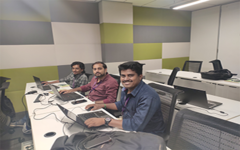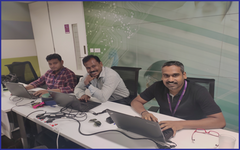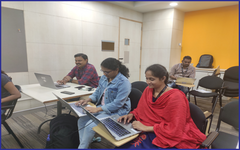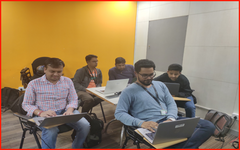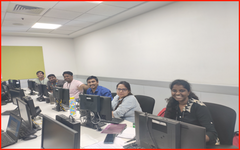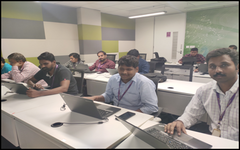Upgrade & Secure Your Future with DevOps, SRE, DevSecOps, MLOps!
We spend hours on Instagram and YouTube and waste money on coffee and fast food, but won’t spend 30 minutes a day learning skills to boost our careers.
Master in DevOps, SRE, DevSecOps & MLOps!
Learn from Guru Rajesh Kumar and double your salary in just one year.
Description
This Datadog training course will provide you to get training and certification from our best and Expert trainers.
The Datadog is a monitoring and analytics tool for infrastructure and important applications and it could be quickly deployed on AWS.
It deals with a variety of monitoring abilities that helps customers promptly search, filter, and analyze logs for troubleshooting.
With more than 350 vendor-supported integrations comprising 75+ AWS service integrations, Datadog seamlessly accumulates metrics and events across the full DevOps stack.
The Datadog training program helps in working on the infrastructure to avoid inexpression, resolve performance problems, and ensure that development and deployment cycles end on time.
Our institute, The DevOpsSchool will help you in providing Datadog training all over the world to share our skills and knowledge with needful candidates. We provide Online as well as Offline classes for Datadog training.
Key Highlights
It includes Live & Interactive Sessions, 250 Hrs. Self-paced Videos, 60 Hrs. Project and Exercises which is certified by DevOpsSchool. Also, we will provide Life lifetime access to Videos Library, Interview & Assessment Support, and Designed for Working Professionals & Fresher, hands-on, Lifetime Free Upgrade using Videos Library. In our Institute, about 900+ Clients and 8000+ students enrolled for the 12 weeks program for weekends. In the 1st week of every month, batches start with 50+ hiring partners. For enrollment, the EMI options are also available for you. The DevOpsSchool is one of the top institutes for training and certification programs with a rating of 4.6 out of 5.
SUB Menu
Upcoming Batches | Eligibility | Skills Covered | Curriculum & Course Details | Certification | Reviews | Projects | FAQs | Video | Our Gallery
Upcoming Batches
1st week of every month
Eligibility
- Network Administrators
- System administrators
- Application developers
- Software engineers
- Data engineers
- IT professionals
- IT Managers
- DevOps Practitioners
- Operations professionals
- Integration specialists
- Linux Users
Who is this program for?
This program is designed for Information technology professionals and experts, Software engineers, System administrators, Network administrators, and related professionals.
Eligibility for this program
You should have a technical background with a system including Windows / Mac / Linux PC, Minimum 2GB RAM, and 20 GB HDD Storage with Windows/CentOS/Red hat/Ubuntu/Fedora.
Skills Covered
Datadog Tagging
- Datadog Agent
- Datadog Integrations
- Datadog Watchdog
- Datadog Events
- Datadog Graphing
- Datadog Dashboard
- Datadog Infrastructure
- Datadog Metrics
- Datadog Notebooks
- Datadog Alerting
- Datadog APM & Distributed Tracing
- Datadog Log Management
- Datadog Synthetics
- Datadog Security Monitoring
- Datadog Real User Monitoring
- Datadog Network Performance Monitoring
- Datadog Developer Tools
- Datadog API
- Datadog Account Management
- Datadog Alerting
Curriculum & Course Details
Day 1
- Getting started
- Integrations
- Infrastructure
- Host Map
- Events
- Dashboards
- Datadog Tagging
- Assigning Tags
- Using Tags
- Agent
- Datadog Agent Usage
- Datadog Agent Docker
- Datadog Agent Kubernetes
- Datadog Agent Cluster Agent
- Datadog Agent Autodiscovery
- Datadog Agent Log Collection
- Datadog Agent Proxy
- Datadog Agent Versions
- Datadog Agent Troubleshooting
- Datadog Agent Guides
- Datadog Agent Security
Day 2
- Datadog Integrations
- Apache
- Tomcat
- Nginx
- MySql
- Amazon Web Services
- Redis
- Azure
- Google Cloud
- Github
- Docker
- Kubernetes
- Java
- PHP
- DOTNET
- Datadog Watchdog
- Overview
- APM metrics: Infrastructure metrics from integrations
- Datadog Events
- Event stream
- Aggregation
- Notifications
Day 3
- Datadog Graphing
- Dashboards
- Metrics
- Notebooks
- Event Stream
- Infrastructure
- From the query to the graph
- Graphing JSON
- Datadog Dashboard
- Screenboards
- Timeboards
- Widgets
- Querying
- Functions
- Correlations
- Template Variables
- Sharing
- Graphing with JSON
- Datadog Infrastructure
- Infrastructure List
- Host Map
- Container Map
- Live Processes
- Live Containers
- Serverless
- Datadog Metrics
- Metrics Introduction
- Metrics Explorer
- Metrics Summary
- Metrics Distributions
- Datadog Notebooks
- Overview
- Notebook List
- New Notebook
- Datadog Alerting
- Monitors
- Manage Monitors
- Monitor Status
- Check Summary
- Notifications
- Downtimes
- Service Level Objectives
- Guides
Day 4
- Datadog APM & Distributed Tracing
- Enable Trace Collection
- Instrument Your Application
- App Analytics
- Connect Logs and Traces
- Runtime Metrics
- Profiling
- Manual Instrumentation
- OpenTracing
- APM Glossary
- Guides
- Troubleshooting
- Datadog Log Management
- Log Collection & Integrations
- Processing
- Live Tail
- Generate Metrics
- Archives
- Indexes
- Log Explorer
- Connect Logs and Traces
- Correlate Logs with Metrics
- Guides
- Security
- Datadog Synthetics
- API Tests
- Browser Tests
- Private Locations
- APM Integration
- Identify Synthetics Bots
- Settings
- Guide
- Troubleshooting
- Datadog Security Monitoring
- Getting Started
- Signals Explorer
- Detection Rules
Day 5
- Datadog Real User Monitoring
- Get Started
- Dashboards
- Explorer
- Data Collected
- Datadog Network Performance Monitoring
- Installation
- Network Page
- Network Map
- Datadog Developer Tools
- DogStatsD
- Custom Metrics
- Events
- Service Checks
- Libraries
- Community Office Hours
- Write a Custom Check
- Write an OpenMetrics Check
- Integrations
- Amazon CloudFormation
- Guides
- Datadog API
- Overview
- Authentication
- Success and errors
- Rate limiting
- Troubleshooting
- Service Checks
- Comments
- Dashboard Lists
- Downtimes
- Datadog Account Management
- User management
- Organization settings
- SSO with SAML
- Multi-org accounts
- Switching between orgs
- Billing
- API and Application Key
- Datadog Alerting
- Agent
- APM (Tracing)
- Log Management
Certification

- Every Certification always plays a vigorous role as it leads you towards enthusiastic knowledge and skillsets.
- It offers you the skill to stand out from others.
- During an interview, it gives you an edge by exciting the interviewer through your certification.
- Our DevOpsSchool helps you get this certificate by making it worth it to have it.
- The DevOpsSchool gives you a completion certificate after the succession of your training. It will be proof of your aptitude for knowledge and skills.
- The training will be given by IT expert trainers who will make you an expert professional to hold this certificate.
Reviews
We had delivered many quality 8000+ participants from different countries we have got excellent reviews that help us stand out from other institutes and be proud. We can now proudly say that we have helped many individuals and working professionals build their careers. Here are some of the reviews that we have got from our participants who are happy by being a part of DevOpsSchool.
Videos
Projects
During this training y, you will get a real-time-based project to work on, which will help you to implement your learnings and also it will boost your knowledge and skills. With important tools and platforms, you will have a real-world experience where we help you to visualize a real development environment, testing environment, and production environment.
FAQs
1. Will I get technical support after completion of training?
Yes, it’s free of cost for a lifetime. We will give you can access to our Google drive where you can drop your query and our trainers will respond to you back.
2. Why should I learn the Datadog course online instead of offline?
First, this is the best option to keep you and your instructor safe in this dangerous pandemic. As well as the environment and benefits that you will get in offline classes same we will provide you in online classes. We will make your experience much better and more comfortable than offline classes. That’s why we provide live and instructor-led online classes where you can interact with your instructor to clear your doubts.
3. How long will it take to complete the course?
It will take approx. 14 Hrs. to fully complete the course.
4. Will I get any placements after the training?
Well, we don’t provide any placements as of now but we can provide you with an interview kit to help you out.
5. What are the pre-requisites to learn Datadog?
There are no prerequisites for DataDog Program. As we are going to start from scratch, you can add yourself to this program to get complete knowledge about Datadog. Even, if any aspirant is planning to enter the IT world or DevOps this course will help them to get all the job-ready skills.
6. Can a non-technical person learn Datadog?
Yes, but it will be very hard to learn because here the technical words and platforms will be used that he will be not aware of so in my recommendation you shouldn’t try but if still if you want to then you should be very concentrated and honest with you as you have to work hard.
7. Do you have online classes or offline classes?
As of now online classes but he it is a group of people requirement then we can discuss offline classes.
8. Will I get the job after completing this course?
Yes, you will be fully capable to perform any task given to you by your domain senior or manager. As you will be a certified engineer who will have all the required skills and knowledge to perform any task.
9. Which kind of certification will DevOpsSchool provide?
It’s a completion certificate. It will show that you have completed the training and have the right skills and knowledge to perform the task assigned by your company.
10. What is the difference between Datadog and Grafana?
DataDog is a paid SaaS tool that offers a range of products for monitoring applications and tech infrastructure. Whereas, Grafana is an open-source web visualization tool that is used with a variety of data sources to create dashboards.
11. Who will be my trainer?
As we have so many trainers it’s not possible to tell you quickly, as we have to go through their availability. But we can assure you will get the best trainer as we have a group of best trainers who are very experienced and skillful trainers. They have 15+ IT working experience.
12. Can I get a demo session?
No, we don’t provide any demo class but instead of that, we can provide you with a class recording so you can decide.
13. Do we have classroom training?
Yes, Classroom training is available in Bangalore, Hyderabad, Chennai, and Delhi locations. Apart from these cities, classroom sessions can be possible if the number of participants is 6 plus in that specific city.
14. How will I execute the hands-on?
All the Demo/Hands-on are to be executed by our trainers on DevOpsSchool’s AWS cloud. We will provide you the step-wise guide to set up the LAB which will be used for doing the hands-on exercises, assignments, etc. Participants can practice by setting up the instances in AWS FREE tier account or they can use Virtual Machines (VMs) for hands-on.
15. What if I miss any class?
In case you miss the class then there are two ways to get to know what topics have been covered, i.e 1st- We will share the class recordings, notes, etc. with you, and 2nd – you can attend any other session under 3 months.
16. What are the features that Datadog offers?
- Customizable dashboards.
- Alerts based on emerging issues.
- Support for over 250 product integrations.
- Can automatically collect and analyze logs, latency, and error rates.
- Permits for access to the API.
- Supports applications written in languages like Java, Python, PHP, .NET, Go, Node and Ruby.
Our Gallery
